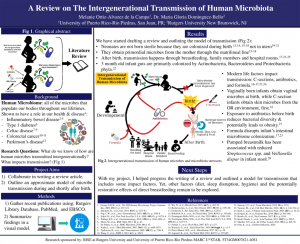Ortiz-Alvarez de la Campa, Melanie: A Review on The Intergenerational Transmission of Human Microbiota
Title: A Review on The Intergenerational Transmission of Human Microbiota
Name: Melanie Ortiz-Alvarez de la Campa
Home Institute: University of Puerto Rico-Rio Piedras
Programs: RISE program, Maximizing Access to Research Careers (MARC)
Other contributors: Maria Gloria Dominguez-Bello
Abstract: In recent years, there has been an increase in research on the human microbiome, and while several reviews have been published, only a few address the problem of changes in lifestyles that may affect the microbiota assembly in early life. This involves an anthropological approach to the intergenerational transmission of human microbes, which we aim to review in this project. To accomplish this aim, I am searching for publications using research databases (PubMed, Google Scholar and EBSCO), and writing the state-of-the-art information found. The review explains the transmission of microbes during and after birth, upon exposure to maternal vaginal and fecal microbes, and how the primordial inoculum is passed through the matrilineal line (our mothers, grandmothers, great-grandmothers, and so on and so forth.) However, modern life factors that impact the intergenerational transmission and colonization of microbes, such as antibiotics, C-sections, milk formula and other process foods, are impairing this natural process, with potential health impacts. This review work has helped create a draft model for inter-generational microbiota transmission.
Biography: Melanie Ortiz-Alvarez de la Campa is a rising senior at the University of Puerto Rico-Rio Piedras where they are pursuing a B.S. in Integrative Biology and a minor in Medical Humanities. They are part of the NIH Maximizing Access to Research Careers (MARC) program at their home institution, where they conduct research with Dr. Paul Bayman in the field of mycology. Currently, Melanie has successfully defended their Undergraduate Thesis proposal titled: Genetic Diversity and Pathogenicity of an Invasive Fungus in Puerto Rico and plans to pursue a PhD in Microbiology. In the future, Melanie aims to become a physician scientist specialized in Forensic Pathology and the Human Microbiome in order to determine the impact of death on human microbiota and its potential forensic applications. In their free time, Melanie does artwork commissions for charity and works as a content creator/writer for The Metric (themetric.org), a student-led news network they helped start in 2017.
